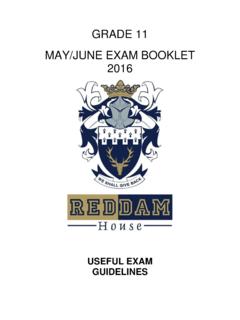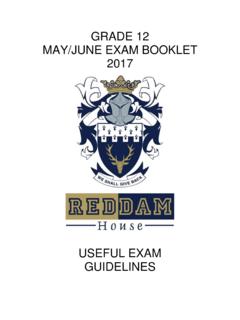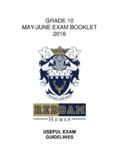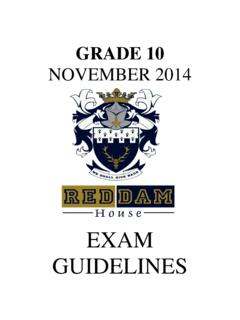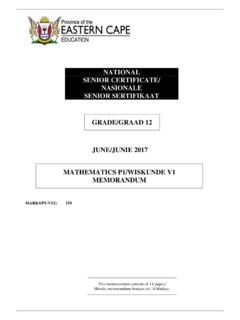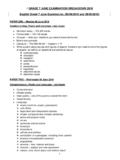Transcription of GRADE 8 MAY/JUNE EXAM BOOKLET 2016 - …
1 GRADE 8. MAY/JUNE EXAM BOOKLET . 2016 . USEFUL EXAM. GUIDELINES. CONTENTS. De-Stress Your exams Study Tips GRADE 8 Exam Timetable What to Prepare: Afrikaans Art Option Biology Computers Dance Studies Design Drama EMS. English French German Geography History Life Orientation Mathematics P1. Mathematics P2. Music Sports Science This document makes use of hyperlinks to help you navigate. If you need to print, however, please print only the subjects relevant to you.. De-Stress Your exams Everyone becomes stressed during exams but it's important not to let stress grow out of control. Here are some common signs of stress and the best ways to de-stress your exams ! A little bit of stress does us good. What are the symptoms of stress? Difficulty getting to sleep or difficulty waking up in the morning Constant tiredness Forgetfulness Unexplained aches and pains Poor appetite Loss of interest in activities Increased anxiety and irritability Increased heart rate Migraines/headaches Blurred vision Dizziness If you've noticed three or more of the above symptoms and you've experienced them for a few weeks you may need to do something about your stress levels.
2 So how should I deal with exam stress? Learn to recognise when you're stressed. A break or a chat with someone who knows the pressure you're under will get things into perspective. Avoid comparing your abilities with your mates. Those "OMG I've only read Macbeth 17. times" conversations are a wind up. Everyone approaches revision in different ways, so just make sure you've chosen the method that works best for you. Make a realistic timetable. Stick to it. Eat correctly. Treat yourself like a well-honed machine. Fresh fruit and veg. Proper breakfasts. No one can think straight on coffee and cornflakes. Sleep well. Wind down before bed. Don't revise under the duvet - your bed is a sanctuary not a desk. Get your 8 hours. Exercise. Nothing de-stresses the mind faster than physical activity. Build it into your timetable. Being a sloth makes our mind sloppy too. Panic is often triggered by hyperventilating ( quick, shallow breaths). So if you feel yourself losing it during the exam, sit back for a moment and control your breathing.
3 Deep breath in and out through the nose. Counting to five each way. Steer clear of any exam 'post-mortem'. It doesn't matter what your mate wrote for Question 3(b). It's too late to go back and change your answers, so it will just make you worry even more. Ultimately, don't lose sight of the fact that there is life after exams . Things might seem intense right now, but it won't last forever. Adapted from an article from BBC Radio 1. Click here for a video and another article that could encourage you to cope with exam stress. Back to Contents Study Tips BEFORE THE EXAM DAY. Do not miss ANY days of school. If you are unwell, come to school to write your exam and then go home. Then you will be able to see how well you know your work and teachers can help you, before the exams , in areas where you are not sure. Make sure that you have all the notes given in class and that all your assignments are completed. Class work is always added to the exam mark to make your term mark and it is usually worth as much, if not more, than the exam mark.
4 At high school you only need to come to school to write the exam. You must make sure that you use your time at home well: study at set times of the day- ask people to test you, make notes, summarise, practice labelling diagrams and maps be active in your learning - don't just read over your work eat healthy snacks exercise every day go to bed at a sensible time ON THE EXAM DAY. You need to arrive for exams at 7h45 latest. You will normally be asked to enter the Main Hall at 8h00. Examiners have to hand out up to 300 papers and this takes time. There is also 10 minutes of reading time before the exam begins. If you are not being collected immediately after the exam, then study in the library. For security reasons you are not allowed to walk to the shops. Dress in FULL school uniform. Bring all the required stationery and a spare pen. CHECK if you need calculators or glue etc. Wear a watch you are NOT allowed to have a cell phone on your desk to check the time.
5 You may NOT read a book or play games while waiting for your exams to be collected. DURING THE EXAM. Use the 10 mins reading time at the start to read through all the questions. Be sure to follow the instructions given for each question. Note how many marks a question is worth so that you know what depth of answer (how many points) to give. PLAN your TIME so that you have enough time to work through each question. Number your questions EXACTLY as they are numbered on the exam paper. Do NOT use Tippex. Simply cross out neatly and rewrite. Don't sit gloomily on one question which you can't do - leave a space and move on come back to it at the end. Make time to CHECK ALL your answers. Back to Contents GRADE 8 Exam Timetable MAY/JUNE 2016 . Day and Date Subject Start End Friday, 20 May Dance Studies 08:30 09:30. Saturday, 21 May No exams for GRADE 8. Monday, 23 May Afrikaans 08:30 10:30. Tuesday, 24 May Drama 08:30 09:30. Wednesday, 25 May Design 08:30 09:30. Thursday, 26 May Mathematics P1 08:30 10:00.
6 Geography 08:30 10:30. Friday, 27 May History 08:30 10:00. Saturday, 28 May No exams for GRADE 8. Monday, 30 May EMS 08:30 09:30. Tuesday, 31 May English 08:30 10:30. Wednesday, 1 june Mathematics P2 08:30 09:30. French 08:30 09:30. Thursday, 2 june German 08:30 09:30. Computers *Please confirm your Friday, 3 june specific class time on 08:30* 14:30*. the Computers page below Saturday, 4 june No exams for GRADE 8. Monday, 6 june Life Orientation 08:30 09:30. Tuesday, 7 june Art Option 08:30 09:30. Wednesday, 8 june Biology 08:30 10:00. Thursday, 9 june Sports Science 08:30 09:30. Friday, 10 june Music 08:30 09:30. Saturday, 11 june No exams for GRADE 8. Back to Contents Dance Studies Friday, 20 May 2016 , 08:30 09:30. Length of paper: 1 hour Marks: 100. Content to be learnt for the exam The glossary The skeleton The individual bones and the categories The spine Types of questions Multiple choice Essays Diagram labelling Tips for learners in preparation for the exam Please bring colouring pencils!
7 Back to Contents Back to Timetable Afrikaans Monday, 23 May 2016 , 08:30 10:30. Length of paper: 2 hours Marks: 100. Content to be learnt for the exam Begripwoordeskat ( ). Klanke ( - ). Woorde wat eenders is ( - ). Voornaamwoorde ( - ). Voorsetsels ( - ). Woordorde (STOMPI, - ). Tye ( - ). Ontkenning ( - ). Woordeskat ( , & ). Agent 2000 (Notes, questions & answers, and Quizlet vocabulary). Types of questions Comprehension (text, advert/other, visual). Film study (similar to questions covered in class). Grammar (As practised). Communication ( , for examples). Vocabulary: Match the words in column A with the description in column B. Give one word for . Vocab relating to pictures Multiple choice Tips for learners in preparation for the exam Comprehension: It is essential that you consciously build your vocabulary throughout the year this is not something you can quickly fix before an exam. That said, study the vocabulary in Also have a look through the vocabulary from comprehension tests previously done in class, specifically the vocab used in the questions.
8 Grammar: If you leave studying for your exam until the day or two before, you will not be able to remember how to apply the grammar rules covered in class. Do 3 or 4 sentences a day to keep it fresh in your memory! The best way to study grammar is to re-do exercises you did in class and then check your answers and your notes afterwards staring at the notes will not help you. Film study: Understanding the storyline is not enough. You have to be able to express in Afrikaans what you know. Therefore, have the vocabulary (Quizlet will help you) to understand questions and to answer the questions in your own words. Back to Contents Back to Timetable Drama Tuesday, 24 May 2016 , Length of paper: 1 hour Marks: 50. Content to be learnt for the exam Notes on the iPad movie process. All the information you used to create your iPad movie. Types of questions Short questions of 1 - 10 marks each Content questions, comprehension questions, application questions, creative questions An ability to think independently , apply knowledge to new questions and draw conclusions based on knowledge and interpretation.
9 Tips for students in preparation for the exam Learn the content thoroughly. Make sure you UNDERSTAND everything you learn. Read the questions carefully so that you understand completely what you are being asked before you begin to answer. Pay attention to the mark allocation and answer accordingly. WORK NEATLY. Make a concerted effort to use punctuation such as capital letters where applicable. Remember to bring coloured pencils. READ your answers to see if they make sense before you hand in your answer sheet Back to Contents Back to Timetable Design Wednesday, 25 May 2015, 08:30 09:30. Length of paper: 1 hour Marks: 60. Content to be learnt for the exam Read through all the notes that have been given to you and stuck in your book These notes are available in Google Homework Illustration Techniques Logo Design Types of questions Mix and match Short questions Practical application pencils or black pen required Visual Analysis Tips for learners in preparation for the exam Read through to notes to understand.
10 All questions are applied knowledge, no rote learning. Back to Contents Back to Timetable Mathematics Paper 1. Thursday, 26 May 2016 , 08:30 10:00. Length of paper: 1 hours Marks: 150. Content to be learnt for the exam All year's work so far: 1. Algebra Vocabulary and terminology ( degree, co-efficient, binomials, polynomials etc). Using all 4 operations (add , subtract , multiply, divide), BODMAS, distribution, fractions and substitution Translating from words into algebra and solving word sums . 2. Integers Basic use of integers All 4 operations with integers Integers applied to algebra 3. Equations Solving basic equations Solving equations with fractions Solving equations using distribution Solving inequalities and drawing number lines Using equations to solve word problems Use equations to solve simple problems in Geometry. Fractions (addition, subtraction, multiplication and division). Simplification, including basic Algebraic fractions Continued on the next page.
